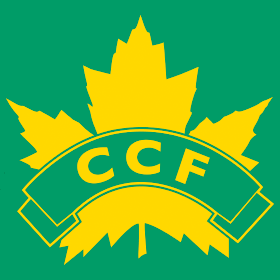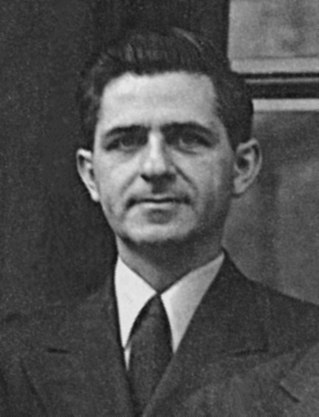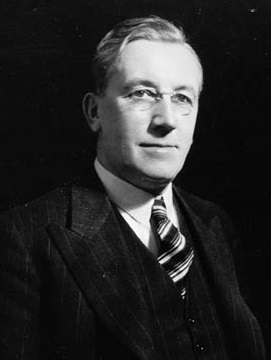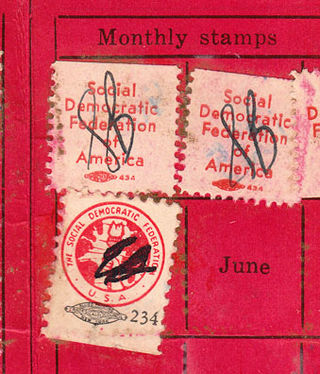
The Co-operative Commonwealth Federation was a federal democratic socialist and social-democratic political party in Canada. The CCF was founded in 1932 in Calgary, Alberta, by a number of socialist, agrarian, co-operative, and labour groups, and the League for Social Reconstruction. In 1944, the CCF formed one of the first social-democratic governments in North America when it was elected to form the provincial government in Saskatchewan.

Thomas Clement Douglas was a Scottish-born Canadian politician who served as the seventh premier of Saskatchewan from 1944 to 1961 and Leader of the New Democratic Party from 1961 to 1971. A Baptist minister, he was elected to the House of Commons of Canada in 1935 as a member of the Co-operative Commonwealth Federation (CCF). He left federal politics to become Leader of the Saskatchewan Co-operative Commonwealth Federation and then the seventh Premier of Saskatchewan. His government introduced the continent's first single-payer, universal health care program.

Roy John Romanow is a Canadian politician who served as the 12th premier of Saskatchewan from 1991 to 2001. He was the leader of the Saskatchewan New Democratic Party from 1987 until his retirement in 2001. He was the Member of the Legislative Assembly for Saskatoon Riversdale from 1967 to 1982 and from 1986 to 2001.
The Regina Manifesto was the programme of the Co-operative Commonwealth Federation (CCF) and was adopted at the first national convention of the CCF held in Regina, Saskatchewan, in 1933. The primary goal of the Regina Manifesto was to eradicate the system of capitalism and replace it with a planned socialist economy. The CCF was a Canadian democratic socialist party founded in 1932 by farmers, workers, and socialist groups against the backdrop of the Great Depression.

David Lewis was a Canadian labour lawyer and social democratic politician. He was national secretary of the Co-operative Commonwealth Federation (CCF) from 1936 to 1950 and one of the key architects of the New Democratic Party (NDP) in 1961. In 1962, he was elected as the Member of Parliament (MP), in the House of Commons of Canada, for the York South electoral district. While an MP, he was elected the NDP's national leader and served from 1971 until 1975. After his defeat in the 1974 federal election, he stepped down as leader and retired from politics. He spent his last years as a university professor at Carleton University and as a travel correspondent for the Toronto Star. In retirement, he was named to the Order of Canada for his political service. After suffering from cancer for a long time, he died in Ottawa in 1981.
The Waffle was a radical wing of Canada's New Democratic Party (NDP) in the late 1960s and early 1970s. It later transformed into an independent political party, with little electoral success before it permanently disbanded in the mid-1970s. It was generally a New Left youth movement that espoused both Canadian nationalism and solidarity with the Quebec sovereignty movement.
The Saskatchewan New Democratic Party, branded as the Saskatchewan New Democrats, is a social democratic political party in Saskatchewan, Canada. The party was founded in 1932 as the Farmer-Labour Group and was known as the Saskatchewan section of the Co-operative Commonwealth Federation (CCF) from 1935 until 1967. While the party is affiliated with the federal New Democratic Party, the Saskatchewan NDP is considered a "distinctly homegrown" party given the role of the province in its development and the party's history in the province.

The New Democratic Party of Manitoba, branded as Manitoba's NDP, is a social democratic political party in Manitoba, Canada. It is the provincial section of the federal New Democratic Party, and is a successor to the Manitoba Co-operative Commonwealth Federation. It is currently the governing party in Manitoba.

Major James William Coldwell was a Canadian democratic socialist politician, and leader of the Co-operative Commonwealth Federation (CCF) party from 1942 to 1960.
The New Brunswick New Democratic Party is a social democratic political party in New Brunswick, Canada. It is the provincial section of the federal New Democratic Party.

Allan Emrys Blakeney was a Canadian politician who served as the tenth premier of Saskatchewan from 1971 to 1982. Originally from Bridgewater, Nova Scotia, Blakeney moved to Regina, Saskatchewan, and worked in the province's civil service before running for office with the Co-operative Commonwealth Federation (CCF) under Tommy Douglas. Blakeney became leader of the Saskatchewan New Democratic Party (NDP) in 1970. Altogether, he was a member of the Legislative Assembly of Saskatchewan from 1960 to 1988.

James Shaver Charleston Woodsworth was a Canadian Methodist minister, politician, and labour activist. He was a pioneer of the Canadian Social Gospel, a Christian religious movement with social democratic values and links to organized labour. A long-time leader and publicist in the movement, Woodsworth served as an elected member of the federal parliament from 1921 until his death in 1942. In 1932, he helped to found the Co-operative Commonwealth Federation (CCF), a socialist political party which was the predecessor to the New Democratic Party (NDP).
The Winnipeg Declaration, sometimes referred to as the Winnipeg Manifesto, was the programme adopted by the Co-operative Commonwealth Federation (CCF) in Canada to replace the Regina Manifesto. Its full name is the "1956 Winnipeg Declaration of Principles of the Co-operative Commonwealth Federation," and it was adopted at the party's national convention held that year in Winnipeg, Manitoba.

The Social Democratic Federation of the United States of America(SDF) was a political party in the United States, formed in 1936 by the so-called "Old Guard" faction of the Socialist Party of America. The SDF later merged again with the Socialist Party in 1957 to form the Socialist Party-Social Democratic Federation (SP-SDF).

Humanist Manifesto is the title of three manifestos laying out a humanist worldview. They are the original A Humanist Manifesto, the Humanist Manifesto II (1973), and Humanism and Its Aspirations: Humanist Manifesto III (2003). The original manifesto originally arose from religious humanism, though secular humanists also signed.
The Manifesto for an Independent Socialist Canada was a document drafted by a leftist faction of Canada's New Democratic Party, known as the Waffle, in 1969. When that group briefly left the NDP between 1972 and 1974, it became their party's main programmatic statement.

Socialism in Canada has a long history and along with conservatism and liberalism is a political force in Canada.
The New Democratic Party is a federal political party in Canada. Widely described as social democratic, the party sits at the centre-left to left-wing of the Canadian political spectrum, with the party generally sitting to the left of the Liberal Party. The party was founded in 1961 by the Co-operative Commonwealth Federation (CCF) and the Canadian Labour Congress (CLC).
The Socialist Party of Canada (SPC) is a socialist political party in Canada, affiliated with the World Socialist Movement.

The Leap Manifesto is a Canadian political manifesto that was issued by a coalition of environmentalists, Indigenous, labour, and faith leaders, authors, and artists in September 2015 in the context of that year's Canadian federal election campaign. The document proposes broad changes to Canadian society and economics to respond to climate change through a policy framework that also addresses issues of wealth and income inequality, racism, and colonialism.












